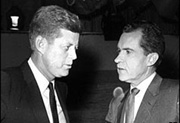 |
| Kennedy and Nixon squaring up for their second presidential debate on 7 October 1960 |
|
1960: Kennedy and Nixon clash in TV debate
|
Artificially 1969: FilmTheTheAA More than 60 million Americans tuned in to watch the first-ever televised debate between the two candidates running for the White House.
Republican candidate Vice President Richard Nixon and Senator John F Kennedy, the Democratic candidate, appeared in a studio in Chicago, Illinois, for the first of a series of four debates.
The first "Great Debate" centred on domestic issues. Each candidate was given eight minutes to make an opening speech. There followed a series of questions from a panel of correspondents, then each man was allowed three minutes and twenty seconds for a final statement.
Among television viewers, Mr Kennedy was regarded the outright winner of the first debate. He appeared tanned, confident and well-rested after campaigning in California.
By contrast, his opponent had recently spent two weeks in hospital for a serious knee operation and still looked underweight with apallidcomplexion. He refused any make-up to improve his colour.
The debate was presided over by Howard Smith of CBS News. His company was also the main broadcaster involved.
The panel of questioners included Walter Cronkite of CBS News, John Edwards from ABC News, John Chancellor of NBC News and Frank Singiser of Mutual News.
Mr Kennedy spoke first of his desire to see America fulfil its economic potential and sustain the needs of individuals through welfare programmes.
He continued: "I think it's time America started moving again."
In his opening statement, Mr Nixon also talked about moving ahead but he defended the track record of the Republicans saying they had built more schools, hospitals and roads than the previous Democrat administration.
The questions were wide-ranging - asking the candidates about their relevant experience for the job of president, to farm policy, and the threat from communism within the United States.
The two men disagreed over farm subsidies and how to fund extra spending on education and welfare.
Mr Kennedy said a steady rate of economic growth would bring in sufficient extra tax revenue to pay for his welfare programme.
Mr Nixon claimed it would be necessary to raise taxes to pay for extra education and medical care.
In his summing up, Mr Nixon said: "I stand for programmes that will mean growth and progress. But it is also essential that he (Senator Kennedy) not allow a dollar spent that could be better spent by the people themselves."
Mr Kennedy replied: "The question before us all...is: can freedom in the next generation conquer, or are the Communists going to be successful? That's the great issue. And if we meet our responsibilities I think freedom will conquer."
|